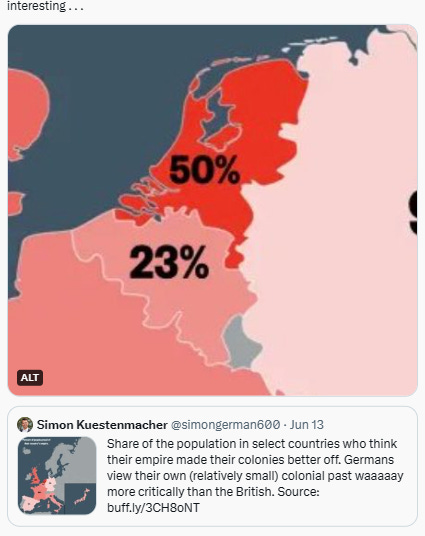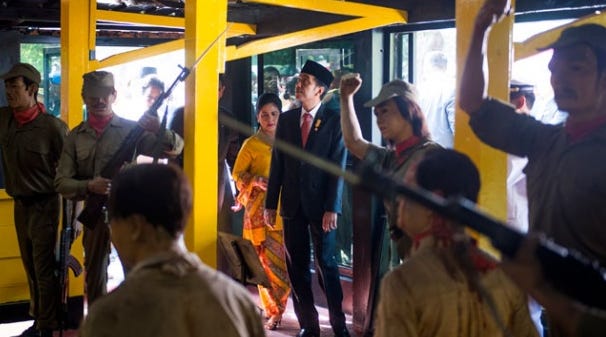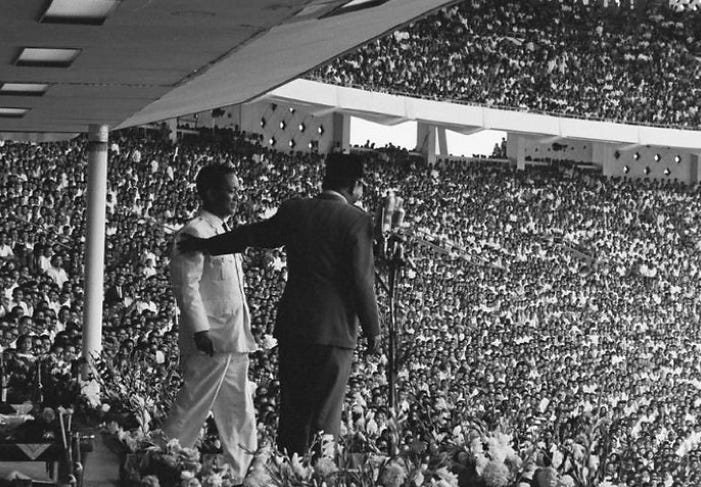Jokowi and (Hopes for) the Exiles
The ghosts of those slain, meanwhile, will continue to haunt us until we admit our collective guilt. The pain isn’t that long ago.
With more communication and a meaningful date (January 11st, 2023 actually least context about PKI issue) would have made the apology more palatable. At least, Jokowi tries. We have to start building — together.
The impact of the 1965 communist purge did not only hit people who were in Indonesia but also those overseas. Thousands of them were unable to return home because their passports were confiscated if they were considered leftists or supporters of founding president Sukarno. Thousands of students, experts, and foreign service officers were cast aside by the New Order regime. These people ended up living overseas, and identified themselves as Indonesian political exiles. Most of the Indonesian political exiles still express their allegiance to Indonesia, and that returning to Indonesia remains their dream. Many even hope that they will be buried or their ashes scattered in Indonesia. "The country put me through school, gave me knowledge, life experience, and work experience. I would love to use all of this for the good of the Indonesian people, but I never had a chance to." an exile says. Indonesia is still dealing with the consequences of casting men and women, now exile, to the wind.
In 1999, then-president (the late) Abdurrahman “Gus Dur” Wahid issued a public apology for the role that Ansor, the youth wing of Nahdlatul Ulama (NU), played in the massacre. Gus Dur was NU chair before becoming president. In 2000, Gus Dur tried to get the exiles to return back home. But after spending decades abroad many of them had built lives of their own. They had families and ties to their new countries. Indonesia, it seemed, was no longer "home." After his death in 2009, NU, Indonesia’s largest Islamic mass organization, retracted his apology. In 2004, the House of Representatives enacted a bill on the formation of a truth and reconciliation commission to look into the 1960s killings, only for it to be annulled by the Constitutional Court in 2006.
Indonesia has come a long way on human rights since the end of the Suharto era. President Joko “Jokowi” Widodo has a real opportunity to address this issue head-on, and to usher in a new era of respect for human rights in Indonesia. In the 8th years, 2 months, and 23 days of his Presidency, Jokowi acknowledged the human rights violations in the anti-communist purges from 1965 to 1966 are huge. Promises to address human rights abuses, especially those that were perpetrated by the government, had been a recurring remark in Jokowi’s presidential campaigns of 2014. The signals from Indonesia’s Jokowi administration are finally encouraging to see the history of the past. Jokowi also compensated victims of anti-communist purges in 1965-66 which killed 500,000 people. But it is not clear how to compensate for Indonesian exile, mostly in Europe.
Jokowi expressed deep regret for crimes including the abduction of students under Suharto and deadly anti-Chinese riots in 1998. The 1965 survivors, descendants community said this is a big step forward, but hope for more.
“With a clear mind and sincere heart, I, as the leader of the Republic of Indonesia, admit that the gross human rights violations really took place in various incidents,” Jokowi said at the Merdeka Palace in Jakarta on Wednesday, Jan 11st 2023.
Jokowi then cited twelve incidents in which serious rights violations had taken place.
For instance, the 1965-66 anti-communist purge, and the 1982-85 Petrus killings, which saw the extrajudicial killing of many thugs. The president regretted what had happened in the 1989 Talangsari incident in Lampung, as well as the Rumoh Geudong and Pos Sattis tragedy in Aceh that occurred in the same year.
He went on to list other violations such as the 1997-98 abduction of pro-democracy activists, and the May 1998 riot triggered by the monetary crisis and discontent over Suharto’s New Order. News outlet Kompas reported that 499 people had died in the 1998 May riot. The unrest saw more than 4,000 buildings destroyed and burnt. The 1998 Trisakti tragedy —the shooting against four Trisakti University students demanding Suharto’s resignation— was also one of the past violations that Jokowi had acknowledged. "As well as the 1998-1999 Semanggi I-II shootings," Jokowi said.
Jokowi also expressed regret over the “1998-1999 killing against black magic sorcerers and the 1999 Simpang KKA incident in Aceh.” The Indonesian government also acknowledged the 2001-2002 Wasior incident and the 2003 Wamena tragedy, both taking place in the outermost province of Papua. Jokowi admitted that human rights abuses had taken place at the 2003 Jambo Keupok incident in Aceh.
“I have deep sympathy for the victims and their families. First, I and the government will try to restore the rights of the victims in a fair and wise manner, without negating the judicial process,” Jokowi said.
“Secondly, I and the government will spare no efforts to make sure that gross human rights violations will not happen again in Indonesia in the future. I ask the Chief Security Minister [Mahfud MD] to oversee the government’s concrete efforts to make sure we can achieve those two things,” the president said. In 2022, Jokowi issued a decree to form a non-judicial settlement team to investigate past human rights violations. Jokowi, recently received the report from a team he had commissioned last year to investigate Indonesia’s bloody history, having promised to take up the issue when he first came to power in 2014.
The special from Jokowi acknowledged, of course, is “very sensitive” 1965 issue. Winarso, a coordinator of a group that cares for survivors of the 1965 bloodshed, said that while the president’s acknowledgment was insufficient it could open up room for discussion about the massacres. The formation of these communities of Indonesian political exiles, and their changing relationships with both host and hostile governments and within the diverse communities in exile, as they struggled to survive the Cold War's thaw. It attempts, firstly, to put Indonesia's relations with the eastern bloc generally into the geo-political context of the Cold War, then to explore Indonesia's specific relationship with key Communist countries, before focussing finally on how the Indonesian exiles in those countries fared with the rise of the New Order in Jakarta after 1965 and within the changing dynamics of the Sino-Soviet split and the end of the Cold War.
According to some estimates, there were thousands of Indonesians living abroad who were affected by the culls. In the process the nation lost its intellectual class, an entire group of people who were educated abroad for the sole purpose of returning home and building the country up. Countries today worry about brain drain, that their citizens will head abroad for their education and then choose to remain in countries where salaries are typically higher and the quality of life is better.
But Sukarno's government made these students sign a kontrak ikatan dinas, a government contract that required them to return once their education was complete. The coup, and Sukarno's oust, killed the founding father's dream of restructuring Indonesian society as a true post-colonial nation. Sukarno was trying to build a unified nation that broke down some of the ethnic barriers that long held people back. His scholarships were for Indonesians of various classes, ethnicities, religions, and political affiliations. Sukarno's dream was to "de-Javanese" Indonesia—effectively reversing centuries of Dutch colonial preference for the island by spreading people, and education, throughout the nation.
Exiles, survivors and descendants of those massacred in Indonesia’s anti-communist purge of 1965-1966 are urging the UK government to apologize for its role in what was described in a secret CIA report as “one of the worst mass murders of the 20th century”.
October 2021, UK The Observer published evidence that Britain played a part in inciting the killings. It is estimated that at least 500,000 people were murdered between 1965 and 1966 by the Indonesian army, militias and vigilantes. The UK government has always denied involvement, but the declassified documents tell a different story.
In 2020, Dutch King Willem-Alexander apologised for the “excessive violence” inflicted on Indonesia during his country’s colonial rule, which ended in 1949. 1 Week before Christmas 2022 (Dec 19th 2022, 74 years after Operation Kraai/Operation Crow, a Dutch military offensive against the de facto Republic of Indonesia in December 1948 after negotiations failed) Prime Minister Mark Rutte AC of the Netherlands formally apologized on behalf of his government for the country’s role in abetting, stimulating, preserving and profiting from centuries of slave trading, (*although not directly mentioned Indonesia as well).
“For hundreds of years, people were made of merchandise, exploited and abused in the name of the Dutch state,” Rutte said. He also said Dutch governments had not done enough to acknowledge that slavery had had lasting negative effects since it was abolished in the Dutch colonies in 1863.
“We’re not doing this just to come clean,” Mr. Rutte said. “We’re not doing this to leave history behind us.”
The run-up to Mr. Rutte’s apology was fraught, with multiple groups of descendants saying that the government had not consulted them and that the occasion lacked any significance. Descendants would not accept Mr. Rutte’s apology, partly because the government did not speak to the right stakeholders and descendants of enslaved people. More communication and a meaningful date would have made the apology more palatable, many people said.
“This apology marks a historic moment,” said Pepijn Brandon, a professor of global economic and social history at the Free University of Amsterdam who has studied 18th-century Atlantic slavery for the Dutch economy. But, he added, “they couldn’t have been prepared any worse.” The speech did not go far enough. July 1, 2022 marks 150 years since the end of slavery in the Dutch colonies, and next year was declared a national year of remembrance. Part of the reason the apology happened on Monday, Mr. Rutte said, was because he wanted to do it before the start of the official commemorations.
Geoctrooieerde Westindische Compagnie / GWC (Dutch West India Company) and Verenigde Oostindische Compagnie / VOC (Dutch East India Company) established with private and state capital and governed by Dutch state officials and, later, royalty. The Netherlands was responsible for the transport of an estimated 600,000 people over the Atlantic Ocean. And under the East India Company, the Netherlands also traded people in Indonesia, India and South Africa. From the 17th century through the 19th century, the companies enslaved more than a million people. While slavery was forbidden in the Netherlands, it was legal — and crucial to the profitable plantations — in Dutch colonies such as Brazil, Indonesia and Suriname. Even after slavery was abolished in the colonies, enslaved people were required to continue working on plantations for another decade afterward to minimize losses for the slave owners.
Whilst, this (Jokowi) acknowledgement necessitates identifying those who enabled Suharto to commit these atrocities—and how it was replicated all over the world.
For example, starting in the 1960s, a US-sponsored campaign of disinformation and violence was used around the world -- with deadly results. It was known as “the Jakarta Method.” The tactic originated in Indonesia, with the help of the CIA. The Jakarta Method is the intentional mass murder of leftists or people accused of being leftist. It was such a big success that it inspired movements elsewhere around the world, specifically in Latin America. Throughout the 1970s, six Latin American governments, led by Chile, formed a military alliance called Operation Condor to carry out kidnappings, torture, and political assassinations across three continents. It was an early “war on terror” initially encouraged by the CIA—which later backfired on the United States. Jakarta became an explicit model for military dictatorships in the 1970s including Brazil, Chile and Argentina.
In Chile, before the coup against President Salvador Allende, the word “Jakarta” started appearing, plastered on walls in Santiago. Left-wing activists started receiving postcards saying “Jakarta is coming.” Operation Condor was one subsequent expression of Jakarta. In 1975, representatives from Argentina, Bolivia, Brazil, Paraguay, Uruguay and Chile decided to work together to torture and kill those they considered subversive. The U.S. government provided planning, coordinating, training on torture, technical aid and military support to the various authoritarian governments. This was largely a CIA project. The alliance set up a program to collaborate to exterminate their enemies worldwide.
Most famously, a Condor operative, Michael Townley, an American with CIA and Chilean secret police connections, organized the murder of the former Chilean Foreign Minister Orlando Letelier and his American assistant, Ronni Moffett, by car bomb in Washington DC in 1976. The Chilean dictator, General Pinochet, ordered the murder.
Chile developed a multiparty system, and experienced another half century of peaceful democracy before Pinochet seized power.
But alongside Chile’s institutional habits runs a current of anarchism and bohemianism. In the years before the coup, the country was shaken by dueling political extremes. When Allende was elected, in 1970, it was the height of the Cold War, and both the U.S. and the Soviet Union saw Chile as a strategic battleground. Although Allende gained power legitimately, he won the popular vote by a razor-thin margin, at the head of a left-wing coalition.
Pinochet’s grip on Chile was loosened in 1998, by a surprise arrest. As he visited the United Kingdom, the Spanish judge Baltasar Garzón had him apprehended on charges of genocide, torture, and terrorism. Pinochet was ultimately allowed to return home, but he was diminished, and spent the rest of his life fighting prosecution. In 2005, he was discovered to have stashed millions of dollars of pilfered government funds in more than a hundred and twenty concealed bank accounts, with help from the U.S.-based Riggs Bank. When Pinochet died, the following year, few Chileans mourned his passing. Chilean problem in post-Pinochet era has been both figuring how to deal with the ensemble that we inherited from Pinochet and how to create a new ensemble
Like Jokowi to bury all bad legacy of Soeharto especially 1965, President of Chile Gabriel Boric Font comes from a cohort that is grimly determined to bury dictator Augusto Pinochet's bitter legacy once and for all. General Pinochet’s brutal dictatorship bestowed Chile with its extreme economic model, and Boric and his influential cohort of student leaders have taken it upon themselves to dispose of it.
Boric has pledged to decentralize Chile, implement a welfare state, increase public spending and include women, non-binary Chileans and Indigenous peoples like never before. But it is Boric’s ultimate goal of extricating the country from the binds of Pinochet’s dictatorship that will define his legacy. “Chile will always take the side of human rights, no matter where, no matter what the color of government involved. We must heal the wounds of the estallido social,” Gabriel Boric Font said. He seemed aware that there would be no more free applause if he failed to bring Chile to a better economy compared to the Pinochet era.
In September 2022, Chile has voted resoundingly to reject a proposed new constitution that President Gabriel Boric argued would have ushered in a new progressive era, in a result that far exceeded the expectations of the conservative opposition.
The new constitution would have had a greater focus on social rights, the environment, and gender equality than the existing charter, which was adopted during the rule of military dictator Augusto Pinochet. It emerged from an agreement between legislators and protesters to end violent rallies against inequality in 2019 in which dozens of people were killed. Boric, who had lobbied hard for the new document, said the results made it evident that people “were not satisfied with the constitutional proposal that the convention presented to Chile.”
To run the economy, Pinochet brought in a group that became known as the Chicago Boys, economists who had studied at the University of Chicago under the libertarians Milton Friedman and Arnold Harberger. (Kast’s older brother led Chile’s central bank.) The country became a proving ground for Latin American neoliberalismo, with wholesale deregulation and the privatization of state-controlled companies, education, health care, and pensions.
After democracy was restored, in 1990, Chile’s governments avoided extremes. For two decades, a center-left coalition known as the Concertación held power in a series of administrations; for another twelve years, control of the country alternated from the center right to the center left. Chile established itself as a stable, upwardly mobile nation amid volatile, poorer neighbors. But the economic policies installed under Pinochet didn’t fundamentally change. Inequities grew more severe.
Back to Indonesia again.
Historical admissions & truth telling about human rights atrocities, including 1965-66 massacres and 1980s & 1990s killings & disappearances don't really mean that much without some mechanisms to hold accountable those responsible. At least, Jokowi, and also his regime, tries better. Jokowi said that the government would seek to restore the rights of victims “fairly and wisely without negating judicial resolving,” though did not specify how.
Any expression of regret must also include a reaffirmation that “serious crimes of the past need to be resolved rightly and justly through judicial means. Justice and reconciliation for victims of the 1965-66 massacres however remains to be reached and official stories continue to permeate institutions within Indonesia. The urgency to rewrite the history of mass violence continues to exist. Giving people who have suffered and survived a name and a face is important in reclaiming their humanity. It is therefore significant to be able to read their names on a list in the back of the book, even though the majority still felt the necessity to speak under a pseudonym.







